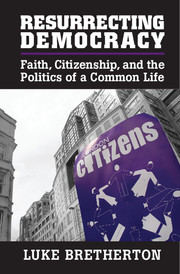Book contents
4 - An Anatomy of Organizing I
Listening, Analysis, and Building Power
Published online by Cambridge University Press: 18 December 2014
Summary
Previous chapters have depicted who is involved in community organizing, where it takes place, and how it emerged historically and intellectually. We turn now to the question of how organizing is done. What are its tactics, strategies, and rules? And what repertoires of political action does it employ? Answering these questions entails addressing the key political questions about power (who does what to whom and how do they achieve it?), judgment (how, when, and where should we act and what should we do?), and legitimacy (why should we act this way rather than that way, who gets to act, and what is the meaning and purpose of our actions?). I shall explore these questions by focusing on the initiation, development, and culmination of the campaign for responsible lending undertaken by London Citizens from 2008 to 2010. The account of the campaign provides a window onto the practices of broad-based community organizing (BBCO) and the dynamics and processes through which London Citizens as a particular instantiation of BBCO achieves its aims and fulfills its vision of democratic politics. This and Chapter 5 investigate what is involved for participants as they move through the sequences of a campaign and how the sequence itself embodies a distinct vision and performance of citizenship. We begin with how an issue is initially identified and a specific policy formulated. We then move on to consider how the capacity to work on an issue and bring about change through political action is developed.
Initiating the Process
The story of how Citizens UK came into being was sketched in Chapter 2. What is given here is an account of the emergent process through which a particular campaign and sequence of actions come into being. Although the campaign focused on is the responsible lending initiative, comparisons will be made to other campaigns in order to give illustrative contrasts and help develop a fuller sense of what community organizing can involve. In any account of something as multifaceted as a political campaign, there is always a degree of tidying up the narrative in order to communicate what happened succinctly and clearly, but as a result, there is a tendency to make things sound more linear than they were. I highlight this danger here in order to raise awareness of the problem in the ensuing examination.
- Type
- Chapter
- Information
- Resurrecting DemocracyFaith, Citizenship, and the Politics of a Common Life, pp. 111 - 147Publisher: Cambridge University PressPrint publication year: 2014



